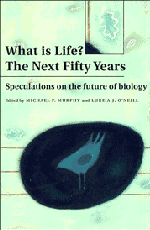Book contents
- Frontmatter
- Contents
- List of contributors
- Preface
- 1 What is Life? The next fifty years. An introduction
- 2 What will endure of 20th century biology?
- 3 ‘What is life?’ as a problem in history
- 4 The evolution of human inventiveness
- 5 Development: is the egg computable or could we generate an angel or a dinosaur?
- 6 Language and life
- 7 RNA without protein or protein without RNA?
- 8 ‘What is life?’: was Schrödinger right?
- 9 Why new physics is needed to understand the mind
- 10 Do the laws of Nature evolve?
- 11 New laws to be expected in the organism: synergetics of brain and behaviour
- 12 Order from disorder: the thermodynamics of complexity in biology
- 13 Reminiscences
- Index
9 - Why new physics is needed to understand the mind
Published online by Cambridge University Press: 03 February 2010
- Frontmatter
- Contents
- List of contributors
- Preface
- 1 What is Life? The next fifty years. An introduction
- 2 What will endure of 20th century biology?
- 3 ‘What is life?’ as a problem in history
- 4 The evolution of human inventiveness
- 5 Development: is the egg computable or could we generate an angel or a dinosaur?
- 6 Language and life
- 7 RNA without protein or protein without RNA?
- 8 ‘What is life?’: was Schrödinger right?
- 9 Why new physics is needed to understand the mind
- 10 Do the laws of Nature evolve?
- 11 New laws to be expected in the organism: synergetics of brain and behaviour
- 12 Order from disorder: the thermodynamics of complexity in biology
- 13 Reminiscences
- Index
Summary
WHY CONSCIOUS UNDERSTANDING IS NON-COMPUTATIONAL
There are many facets to human mentality. It may well be that some of these can be explained in terms of our present-day physical concepts (compare Schrödinger, 1958) and, moreover, are potentially amenable to computational simulation. The proponents of artificial intelligence (AI) would maintain that such a simulation is indeed possible – at least for a good many of those mental qualities that are basically involved in our intelligence. Furthermore, such a simulation could be put to use in enabling a robot to behave, in those particular respects, in the same kind of way as a human being might behave. The proponents of strong AI would maintain, moreover, that every mental quality can be emulated – and will eventually be superseded – by the actions of electronic computers. They would also maintain that such mere computational action must evoke the same kind of conscious experiences in a computer, or robot, as we experience ourselves.
On the other hand, there are many who would argue to the contrary: that there are aspects of our mentality that cannot be addressed merely in terms of computation. Human consciousness, on such a view, would be such a quality – so it is not simply a manifestation of computation. Indeed, I shall argue so myself; but more than this, I shall argue that those actions which our brains perform in accordance with conscious deliberations must be things that cannot even be simulated computationally – so certainly computation cannot of itself give rise to any kind of conscious experience.
- Type
- Chapter
- Information
- What is Life? The Next Fifty YearsSpeculations on the Future of Biology, pp. 115 - 130Publisher: Cambridge University PressPrint publication year: 1995
- 1
- Cited by



